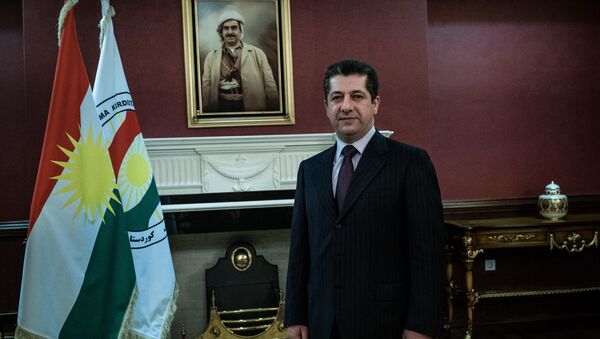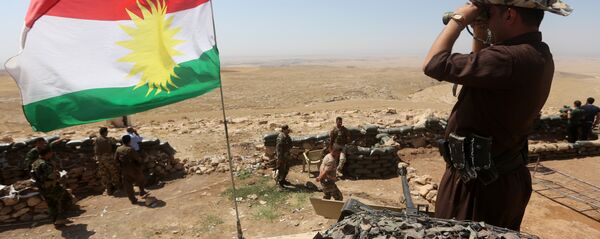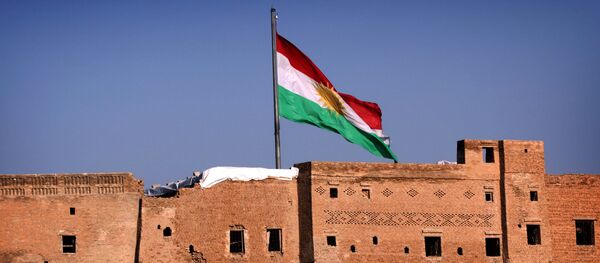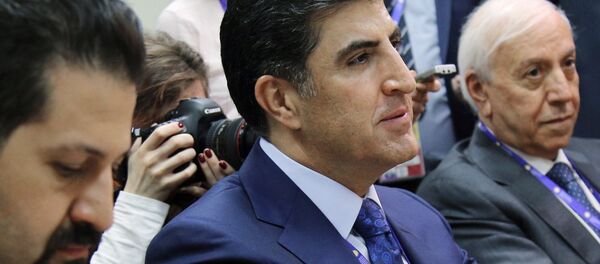The KRG, and citizens of the autonomous region in northern Iraq, known as Iraqi Kurdistan, have long been calling for independence from the Arab state.
Discussions regarding such a referendum have been ongoing for several years, and were accentuated by spending cuts to the KRG's budget by the Iraqi federal government, which was, at the time, headed by Nouri al-Maliki.
Ultimately, the rapid rise of Daesh in Iraq and neighboring Syria disrupted plans for the referendum.
Shortly after Iraq's second city, Mosul, was retaken by a range of forces supported by the US-led air coalition, President Masoud Barzani announced concrete plans for a political process to determine whether or not Iraqi Kurdistan will break away from Iraq, and form its own sovereign state.
"The referendum issue is about the destiny of a whole people. That's why this issue is bigger than any other political framework, or any political parties, or any political problems within the party system. I'm sure that the majority of the people in Kurdistan are with the referendum. The supporters of the political parties, the majority of them are also pro-referendum," President of Iraqi Kurdistan and leader of the Kurdistan Democratic Party (KDP), Masoud Barzani, told FP, in an interview earlier this year.
There is undoubtedly significant support for the creation of a sovereign Kurdish state in northern Iraq, from Kurds living in the autonomous region, as well as Kurdish diaspora internationally, but Iraq, and foreign powers, including the US, are hesitant to throw their weight behind the referendum.
Iraq's federal government has already expressed its discontent, which has been heightened due to the inclusion of disputed territory in the provisional area that could potentially form Kurdistan. The disputed areas, which were opportunely captured by the Peshmerga Armed Forces in 2014 during Daesh's sweeping gains across the country, include the oil-rich city of Kirkuk.
The Iraqi government maintains that the territory is part of Iraq, while the KRG view it as categorically and undisputedly Kurdish. This disagreement further complicates an already highly controversial, and complex issue.
Some regional powers, especially nations where the wider, theoretical Kurdish state crosses into (Iran, Turkey and Syria), have voiced their concerns over the referendum, warning that it could spell chaos for the Middle East.
"A position must be taken to the end against Barzani's preparation for an independence referendum which incorporates Turkmen cities. This is a rehearsal for Kurdistan. If necessary Turkey should deem this referendum as a reason for war," leader of the Turkish Nationalist Movement Party (MHP), Devlet Bahceli, told a news conference in Ankara in August.
They fear that an independent Kurdish state in Iraq could initiate and set precedent for Kurdish independence in other countries — something they all unwaveringly oppose. This is a much less likely prospect in Iran and Turkey, as Kurdish PJAK and PKK militias don't hold significant territory.
This starkly contrasts to the Democratic Union Party's (PYD) control over much of northern Syria, forming a de facto autonomous region, known as Rojava. Rojava isn't recognized by the Syrian government, or any other international power.
Although there aren't concrete plans for a referendum on independence to be held in SDF-controlled parts of Syria in the immediate future, officials from the Syrian government have expressed their concerns and resistance to any process that would threaten Syria's sovereignty and unity.
This issue is likely to become more relevant as Daesh, and other Islamist militants, are pushed out of Syria, creating a potential stand-off between the Syrian Army, and the Kurdish-led SDF.
Although sporadic clashes have erupted between the two parties throughout the war, widespread cooperation between the Syrian government and the PYD is ongoing, with Syrian authorities assisting in the governing of Rojava, and the provision of public services.
Ties between the two nations strengthened as a result of their coordinated anti-Daesh operations in Iraq. Russia is now playing an increasingly important role in Iraqi Kurdistan's economy, especially in the energy sector, with the signing of a deal with Rosneft which is estimated to almost double Iraqi Kurdistan's oil production capacity.
The outcome of the upcoming referendum on Kurdish independence will be watched closely, not only by Kurds and the Iraqi government, but also the wider region, and international powers, as it could reshape Iraq's borders, and potentially initiate a war with Baghdad.
The views expressed in this article are solely those of the author and do not necessarily reflect the official position of Sputnik.




